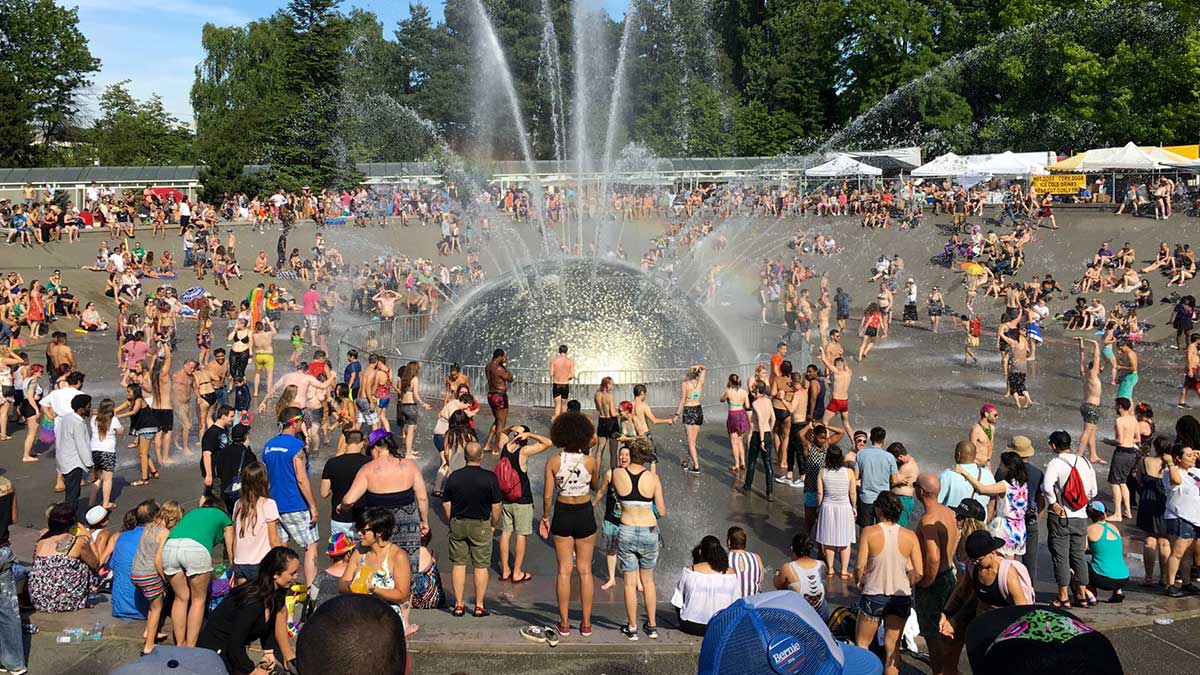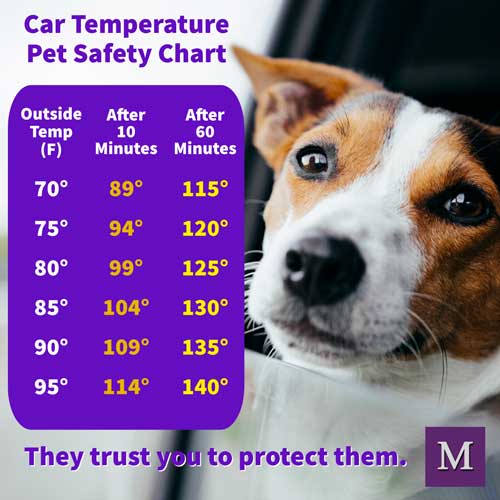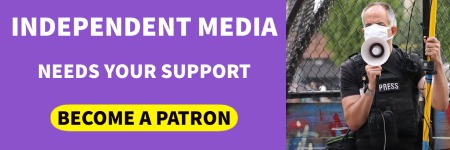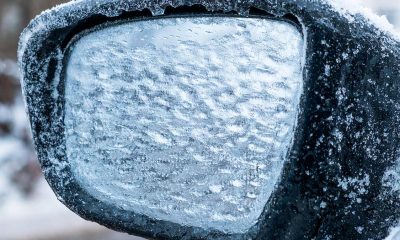Health and Lifestyle
How you can keep it cool during this weekend’s heatwave
Kirkland and King County Health are working on their emergency response plans for the coming heatwave.

[KIRKLAND] – (MTN) Meteorologists don’t toss around words such as historic and unprecedented lightly, but those adjectives perfectly describe the heatwave that starts on Friday. Temperatures of 95 to 105 degrees are dangerous for humans and pets and not typical for the Puget Sound lowlands.
We have reached out to Kirkland, Bellevue, and King County Health to find out their plans with the community. Kirkland and King County are finalizing their programs, and at publication time, Bellevue has not responded to our request.
Here are some tips from King County Health and other area experts on dealing with the extreme weather this weekend. If you don’t have access to air conditioning, we can’t promise these tips will keep you from being miserable, but they will help keep you safe.
Stay cool
- The best way to keep cool is to find air conditioning. If you don’t have access to air conditioning, consider visiting a mall or other cooled public spaces. The indoor mask mandate for COVID ends on June 29, so you will still need to mask up indoors. Locally, Crossroads Mall is a popular place to go to beat the heat.
- Consider having a staycation at an area hotel with air conditioning. Occupancy rates are low but expect hotels to be booked solid the closer we get to the weekend.
- Cover your windows and follow the indoor and outdoor temperatures. In the evening, open your windows as soon as the outside temperature is cooler than the inside temperature. In the morning, close your windows and all your blinds and curtains. You can wrap cardboard with aluminum foil to reflect solar energy from windows that face the west or south. When the inside becomes hotter than the outside, open the windows again.
- Wear light-colored clothing and dress lightly. Your body can cool itself better.
- Take a cool-cold shower or bath. If you live in a multistory building with no air conditioning, covering yourself in cold, wet towels can provide some comfort.
- If you live in a multistory building, move to the lowest level. If you can move to a basement area, you’ll find even more relief.
- Most in-room portable air conditioners are ineffective. Air conditioners that face outside and can be placed in a window work best. Be sure to secure a portable air conditioner following the manufacturer’s directions.
Stay hydrated
- Drink plenty of water. If you feel thirsty, you are already dehydrated. Watch your urine to check your hydration – it should be straw-colored to clear looking. If it is dark yellow to brown, you could be dangerously dehydrated.
- Don’t drink alcohol or large amounts of caffeine. Alcohol and caffeinated drinks such as soft drinks, energy drinks, coffee, and tea, dehydrate you.
- Carry bottled water or a water bottle with you at all times and take frequent small sips. Don’t wait until you feel thirsty to drink.
When outside
- Limit your time in direct sunlight. Avoid being outside from 11 AM to 6 PM if at all possible. Our heatwave is coming during the longest days of the year in the Puget Sound region. The extended daylight elongates our hottest hours, and peak temperatures typically come between 5 PM and 6 PM this time of the year.
- Never leave infants, children, or anyone with mobility challenges in a parked car, even with the windows down.
- Wear sunscreen and reapply frequently. There isn’t much difference in protection above SPF-30. If you get sunburned, you diminish your body’s natural ability to cool down. Don’t swim for 30 minutes after applying sunscreen and reapply when you come out of the water. Consider wearing a swim shirt with UV protection if you’re going to kayak, canoe, or paddleboard. Washington state has one of the highest skin cancer rates in the United States.
- Wear footwear everywhere. We rarely get so hot in Puget Sound, where sand, concrete, and pavement can burn. Don’t walk on hard surfaces or the beach without footwear. If you are wearing sandals or open shoes, be sure to apply sunscreen to your feet.
For pets
- Never leave your pets in a locked car, even if the windows are down.
- If you have access to air conditioning, it is best to bring your pets inside – if you’re hot, they are hot.
- If you have outdoor only pets or livestock, ensure they have access to shade and cool surfaces to stand and lie on, such as grass. Enclosed dog houses and chicken coops can get much hotter than outside areas and won’t provide adequate shade.
- Don’t walk your dog or other pet on hard surfaces like pavement and concrete, even for short distances. Their paws can get burned. If it’s too hot for you to stand still barefoot, it is too hot for them.
- Provide plenty of water for your pets and livestock. Consider getting a kiddie pool for animals to drink from or lay in to cool off.
- Do not assume that your electric car or car with a remote starting system will stay running even for a short time. It is best to leave your pet home.
- It is illegal in Washington for someone who is not a commissioned law enforcement officer or animal control officer to break a car window to rescue a pet in distress. Call 911 first and seek permission for immediate intervention. If you are still compelled to break a window, only do so with third-party witnesses who agree that the animal is in immediate danger.
- Know the signs of heat exhaustion and heat stroke in your pets
- Excessive panting
- Confusion and disorientation
- Vomiting or diarrhea
- Bright red gums
- Body temperature over 104° F.
- Collapse, seizure, or coma

Pre-Existing health issues
- Certain medications can impact your natural ability to deal with hot weather or increase your chances of getting sunburned. If you have questions, contact your medical provider.
- Do not take salt tablets unless directed by a medical professional.
- Some medications, such as certain antibiotics, can lose their effectiveness due to sun exposure. Check with your healthcare provider if you have questions.
Water safety
- All of our bodies of water are still very cold, and hypothermia is possible even on a 100-degree day. Wear a lifejacket (personal floatation device) if you plan to canoe, kayak, paddleboard, waterski, or go boating.
- Swim in designated areas, preferably with a lifeguard. Do not swim alone, and do not swim outside of your abilities.
- Never allow children to swim unsupervised.
- Don’t leave backyard pools, even above ground or shallow portable pools, unsecured. If you own a private pool, check to make sure your gate is up to code and the safety latches operate correctly.
- If you plan to tube, raft, kayak, or canoe in our area rivers, stay within your ability. High temperatures increase snowpack and ice melt, raising river levels, increasing flow, and lowering temperatures.
- Never do water recreation near low head dams. If you go over, the currents at the base of the dam are almost impossible to escape.
- If you find yourself in white water, try to head downstream feet first and face up to prevent head injuries, and see where you are going. Don’t panic, and try to steer yourself to where you can get out of the water, even if that means becoming stranded mid-river and waiting for rescue.
- Avoid down trees in the water, also known as strainers and plan your route around them. It is extremely difficult to escape from the branches due to the water pressure pushing against your body.
- Never dive in areas where you don’t know the depth or unaware of any possible underwater obstacles.
Protecting others
- If you have friends or family who are elderly or have mobility challenges, do periodic welfare checks, especially if they don’t have access to air conditioning.
- The extreme heat will dramatically increase fire danger, even in the urban areas of the lowlands. Refrain from using fireworks, which are currently illegal in all areas of King County. If you use a backyard fire pit, make sure the fire is completely extinguished, and there are no hot embers when you are done using it.
- The houseless community has fewer options for getting out of the heat. Donations of bottled water and non-caffeinated sports drinks will help keep the unhomed community safe.
Recognizing heat-related injuries – heat exhaustion and heat stroke
- Heat exhaustion is caused when a person’s body can’t cool down quickly enough. Know the symptoms:
- Muscle cramps, especially in the arms, legs, and abdomen
- Weakness
- Dizziness
- Extreme thirst
- Headache
- Nausea
- Vomiting
- If you see someone exhibiting these symptoms, move them to a cool area, have them slowly sip water or a sports beverage. If they do not start feeling better after 30 minutes, seek medical attention for heat stroke.
- Heat stroke is a serious medical emergency and can be fatal. Heat exhaustion usually precedes heat stroke. Know the symptoms:
- Body temperature over 103° F.
- Red, hot, dry skin – the inability to sweat
- Rapid, strong pulse
- Fast breathing
- Severe nausea
- Confusion, altered mental state
- Loss of consciousness
- Seizure
- If you see someone exhibiting these symptoms, contact emergency services and move them to a cooler area immediately.










